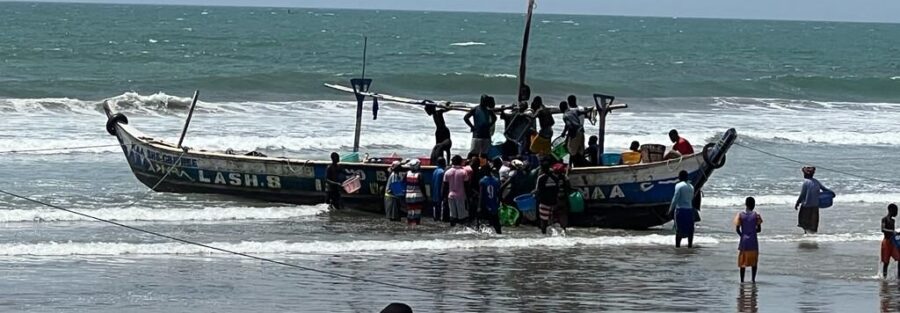Project Background
Foreign-owned distant water fishing vessels (DWFVs) in the Gulf of Guinea (GoG) and Mauritanian waters significantly benefit from unsustainable exploitation and inadequate control of ocean resources in the region.
The destabilising impacts of these foreign DWF vessels in the GoG and Mauritania include depleting fish stocks; illegal, unreported, and unregulated (IUU) fishing; and negative effects in livelihood of artisanal fishers. West Africa alone loses on average about 790,000 tons of fish a year to IUU fishing by foreign and domestic industrial fishing vessels, resulting in economic losses and income impacts of over $2 billion annually.
There is growing awareness of IUU fishing activities and the destabilizing effects of DWFV in the GoG and the need for GoG countries and their respective coastal communities to take greater control of their ocean resources and its governance.
While there have been attempts to improve national ocean governance schemes, particularly to align fishing practices with global best standards, this project falls under a program which focuses on a novice and comprehensive approach by improving economic governance, inclusive economic growth, and prosperity so coastal communities and local fishing industries can strategically compete with foreign actors who undertake unsustainable fishing in the regions.
The project will focus on building institutional capacity necessary to identify and protect coastal communities and local industries from foreign actors in the marine space that undermine the security of local supply chains, political autonomy, economic resilience, and national economic security.
Project Objectives
1. Increase CSO monitoring, media reporting, and public awareness of the destabilizing influences of distant water fishing vessels
2. Deepen Monitoring, Control and Surveillance capabilities, and enhance sharing of actionable fishing information and intelligence
3. Enhance transparency and accountability in the distant water fishing governance sector
4. Promote resilient domestic/regional fishing industry
Project Implementing Partners
Centre for Maritime Law and Security Africa (CEMLAWS Africa) and the Centre for Coastal Management-University of Cape Coast (CCM-UCC)
Project Activity Countries
Benin, Cameroon, Cote d’Ivoire, Ghana, Mauritania, Senegal, and Sierra Leone
Funded by the U.S. Department of State, U.S Embassy Accra





